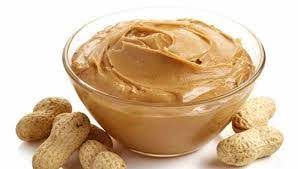
Peanut, or groundnut (Arachis hypogaea), is a species in the legume or "bean" family (Fabaceae). The peanut was probably first cultivated in the valleys of Peru.
It is an annual herbaceous plant growing 30 to 50 cm (1.0 to 1.6 ft) tall. The leaves are opposite, pinnate with four leaflets (two opposite pairs; no terminal leaflet), each leaflet 1 to 7 cm (⅜ to 2¾ in) long and 1 to 3 cm (⅜ to 1 inch) broad. The flowers are a typical peaflower in shape, 2 to 4 cm (0.8 to 1.6 in) (¾ to 1½ in) across, yellow with reddish veining.
Hypogaea means "under the earth", after pollination, the flower stalk elongates causing it to bend until the ovary touches the ground. Continued stalk growth then pushes the ovary underground where the mature fruit develops into a legume pod, the peanut – a classical example of geocarpy. Pods are 3 to 7 cm (1.2 to 2.8 in) long, containing 1 to 4 seeds.
Groundnuts also have a variety of industrial end uses. Paint, varnish, lubricating oil, leather dressings, furniture polish, insecticides, and nitroglycerin are made from groundnut oil. Soap is made from saponified oil, and many cosmetics contain groundnut oil and its derivatives. The protein portion of the oil is used in the manufacturing of some textile fibres. Groundnut shells are used in the manufacture of plastic, wallboard, abrasives, fuel, cellulose (used in rayon and paper) and mucilage (glue).
Groundnuts are also used for food and as an ingredient in confectionery products. After the extraction of oil, the residual cake is processed largely for animal feed, but is also used for human consumption.
Nigeria currently produces about two million (2,000,000) metric tons (MT) representing five percent (5%) of world production and in the period between 1956 and 1967, groundnuts including its cake and oil, accounted for about seventy percent (70%) of Nigeria’s total export earnings and created the legendary groundnut pyramids which dotted the landscape of Kano.
Some of the other states where groundnut is produced in Nigeria include Kwara, Kaduna, Sokoto, Bauchi, Katsina, Zamfara, Nassarawa and most of the northern states.
Groundnut is the 13th most important food crop of the world. It is the world’s 4th most important source of edible oil and 3rd most important source of vegetable protein. Groundnut seeds contain high quality edible oil (50%), easily digestible protein (25%) and carbohydrate (20%).
One of the products that can be produced from groundnuts is groundnut paste. Groundnut paste is a smooth paste made from dry-roasted peanuts, sometimes with added salt or sugar. It is a popular food in Australia, parts of Asia, parts of Europe and North America.
The U.S. and China are the world’s leading exporters of groundnut paste. It is most commonly served as a sandwich spread and has been traditionally paired with jelly or jam. In South Eastern Nigeria Groundnut Paste is usually served along with garden egg.























